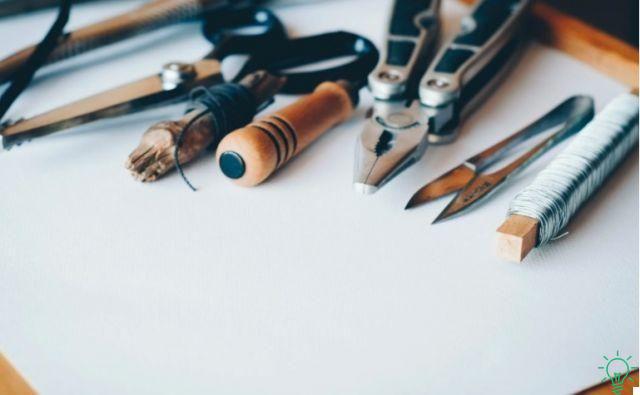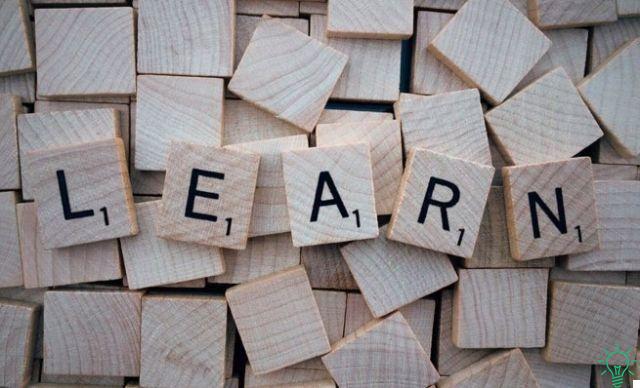
I do not want to study is the phrase I hear most often to students, followed by some variations such as:
- "I don't want to study anymore" (implying that first you had it and then for some reason it disappeared)
- "I can not study"
- "I don't feel like studying"
And when they say or write these sentences to me, I clearly perceive the bottom of despair / exasperation behind it, as if not wanting to study were an indelible mark of doom.
And not, as we will see, something completely normal and for which, with a little effort, a solution can be found.
In today's article, therefore, we will analyze step by step how to make you want to study.
Epidemiology of the unwillingness to study
First I'll tell you a secret: hardly anyone wants to study.
People want to eat, sleep, have fun, go out with friends, play tennis, but they don't normally study.
So you're not weird at all, you don't have to feel guilty, you don't have to be stressed too much by anyone, least of all by yourself.
Because what you must want to study is a myth that is handed down from one generation to the next, as if it were normal to have it.
While it is exactly the opposite.
In fact, I believe that if a group of Nobel laureates had been asked to devise an activity that 20-year-old boys / girls don't really want to do, those brains would probably have drawn something like sitting these boys for 5 hours. a day at a table, still, with pen and highlighter in hand, studying.
From this follows an obvious consequence:
if you try to solve your study problems by trying to find the desire to study "with a hammer", you are probably wasting your time and getting your goal wrong.
In addition, you also risk going from the generic "not wanting" to the more specific "I hate studying", precisely due to excess effort.
It is what I call the "lentil effect": that is, it is a bit like when your mother, as a child, makes you eat lentils by force and so, if you simply did not like them before, now you hate them (taken from a true story, mine).
So let's see 3 tips that, once internalized and put into practice, will make you want to study or come back.
1 - The desire to study is not that important
…. and then control your mental dialogue by giving the problems the right proportions!
I try to simulate the internal dialogue in the brain of a student who does not want to study, making a collage of sentences that the readers of the blog wrote to me.
Maybe you find yourself in some of them:
I'm a mess ... I don't want to study, I really don't want to. Why can't I commit? The exam date is approaching and I am further and further behind. Mhhh ... I might not introduce myself and prepare it better next time ... No, I can't, I have already told everyone that I will take the exam ... From tomorrow I try to really study ... Let's hope, it is days that I try to make me want to put my head on the book, but there is no verse.
The psychological reasons for this mental work can be manifold.
But, in most cases, they can be resolved by simply replacing them with the following short internal dialogue.
Brain: "I do not want to study"
You: "Never mind, study the same"
Too easy?
But in fact, if you think about it, studying is simple!
It's not like running a marathon, climbing a mountain or winning a tournament.
These are complex activities, requiring months of training, diet, preparation and great willpower.
Studying in comparison is trivial.
Just get up from the sofa, go to your desk, open your book and start studying. If you want, you can even skip the part where you get up from the sofa!
Of course, studying fast and well is yet another thing, but to get there (and you will get there) you have to take the first, indispensable, step: open the book.
And even in total absence of desire, you will agree with me that opening a book is an affordable effort for anyone.
Except that, when you constantly repeat to yourself "I don't want to study" or "I can't study", you unconsciously give these sensations enormous power, making them a real physical barrier, an insurmountable mountain.
It is a typical case of self-fulfilling prophecy.
So, in summary, the first and most important thing to do to overcome your lack of desire to study is to stop giving it so much importance!
2 - The desire to study is a choice
…. and therefore you don't have to study out of desire, the desire comes and goes, but by choice.
In fact, it is by choice that all things should be done, whether simple or difficult.
You choose that you are interested in, or that they are part of your goals, or that for some reason are important, and then you carry out the choice regardless of the desire.
The choice must prevail over the desire, because the choice is what your heart and your brain at a certain moment decided it was valuable to you, while the desire is nothing more than the mood of the moment.
Choice is what makes you free, but desire is what makes you a slave, fundamentally to yourself.
So when you don't feel like studying, mentally go back to the choice you made and the reasons that supported it.
To do this you have to free your mind from the internal dialogue and fix the contents of this dialogue on paper, in such a way that they take shape.
When you feel that you want to study zero, even before reaching this extreme, take a pen and paper and then:
- Try to remember why you chose the course you are in
- Make a list of all its positives
- Make a list of all its downsides
- Explicitly consider the possibility of change. It is feasible? Do you have alternatives that you like?
- Briefly describe what you are looking for in your studies, what possibilities it opens up to you, whether or not it brings you closer to the type of life you are interested in doing
- Finally, if you can, identify some role model you would like to follow, someone you would like to become
The order in which you have to tackle the various points is not random:
- The first point refers to the original reasons why you made your choice
- The second and the third they describe how you feel now that you are living the choice made.
- The last three instead they refer to the future, considering both possible alternatives and where the choice made can lead you.
The answers you give yourself:
- They will let you know if what you are doing makes sense to you and how much it makes sense to you
- They will make you reconsider your initial motivation, to see if and how it has changed
- They will get you out of inertia, either by taking you back to the books or by making you decide to change your path
3 - The desire to study is a habit
…. and like any good habit, it can be taken or lost.
Students who manage to study consistently do not put themselves on books every day, squeezing their muscle of will with enormous effort.
Instead, they take it easy, on autopilot, because they have got into the habit of doing it.
Conversely, those who fail to study often are because they have acquired habits that do not favor them: they study in an environment full of distractions, get lost between television and console, continually postpone the time to start, and so on.
As we have seen other times, everything we do thanks to willpower consumes a lot of energy, both physical and psychic, while everything we do thanks to habits costs us little effort.
To get rid of the problem of the desire to study, therefore, it is essential that you develop good habits and abandon the harmful ones:
- try to always study in the same place and at the same times, creating an environment that you like and eliminating any kind of distraction
- make a list of all the habits that distract you and waste your time, and then break them down one after the other
- schedule your time with a to do list system, such as the Ivy Lee method
- uses productivity techniques such as that of the tomato or the logbook
- use the stimulus / action / reward system to trigger and strengthen your habits, as told in this article on willpower
(If you want to learn more about the mechanisms for have a will of steel, read the Kata of the Will, available on Amazon)
Conclusions on the desire to study
Life is a continuous resistance to inertia…. Who gets tired of wanting, wants nothing (Friedrich Nietzsche)
To conclude, I want to leave you two final reflections.
The first is that, as often happens, what works for the studio can also work in other areas.
Think back for a moment to the three tips I just gave you to increase your desire to study:
- Control your mental dialogue by giving problems the right proportions
- Maintain awareness of your choices, and with it the motivation that determined them
- Develop habits that serve your goals, not against them.
They sound good in so many other aspects of life too, don't they?
Here then is that studying well is no longer just an end in itself, but it is an opportunity to build a true discipline of mind and character.
The second final reflection that I leave you today is that the desire to study is almost never an on / off button.
It changes from day to day, from exam to exam, from session to session.
This, for some students, is a source of enormous stress, because they do not understand why they are unable to give continuity to their determination.
To these I want to say that, again, it is something absolutely normal.
Will is a sensation which fluctuates, which increases and decreases, which is lost and found cyclically.
Those who meditate know what I am talking about.
You see, when you meditate you have to create a kind of mental emptiness within yourself, avoiding wandering your mind towards external thoughts.
Your mind, however, inevitably and without you even realizing it, continually runs away towards some thought.
Those who are beginners live it very badly, get exasperated and stressed, and in the end obviously meditate badly.
Those who have more experience, on the other hand, know that this process of concentration / distancing is absolutely normal, and every time the mind runs away it catches it back and brings it back. softly and calmly where was it.
With the desire to study the same thing must happen: you never reach a point of total and permanent "on", it is a continuous distraction and find yourself.
This is why finding it “with a hammer” is not only difficult, but also very frustrating.
If instead you accept these fluctuations as part of the game and, using the strategies we have seen above, you carry yourself back every time, softly and calmly, towards an ideal state, in addition to improving your results you will avoid stress and improve your quality of life.
A greeting. Anthony.

























